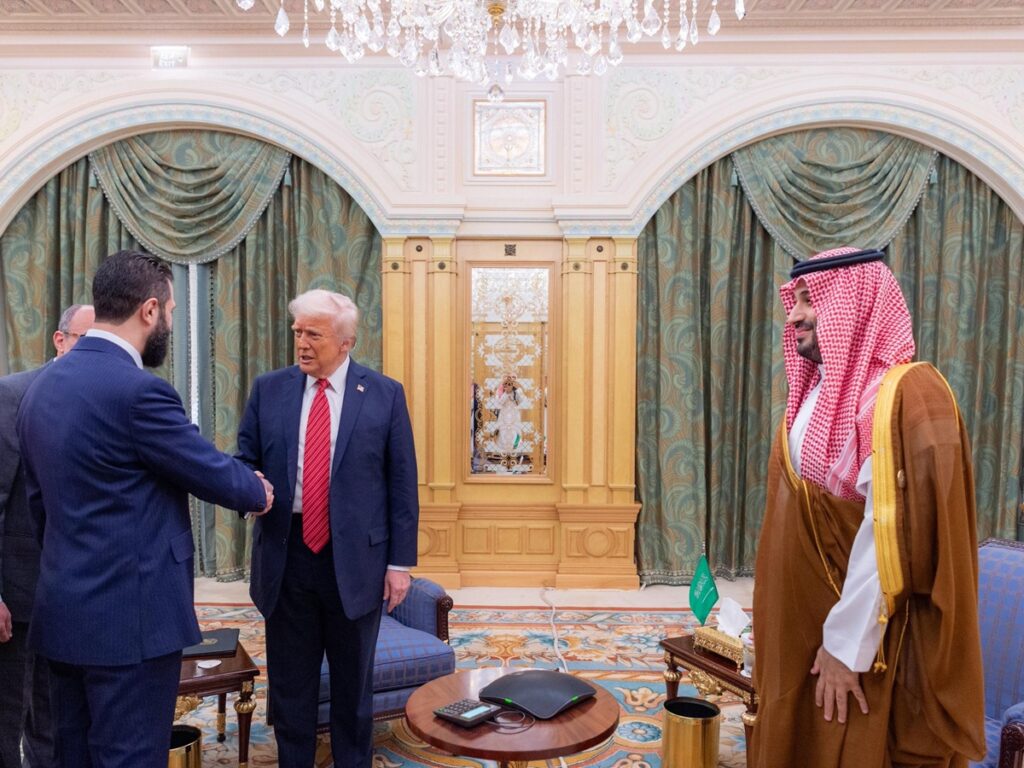Former HTS Commander Al-Julani, Now Syria’s Interim President, Welcomed by Trump Amid Sanctions Rollback
By Our Correspondent
NEW DELHI: In a move stirring global controversy, former U.S. President Donald Trump has become the first American leader to publicly meet and endorse a man once designated a terrorist by the U.S. government. The man in question is Ahmed al-Shara—better known by his former nom de guerre, Abu Mohammad al-Julani—the current interim President of Syria and former leader of the jihadist group Hayat Tahrir al-Sham (HTS).
HTS was once affiliated with al-Qaeda and played a major role in the Syrian civil war. It had long been listed by the United States as a foreign terrorist organization. Al-Julani himself had previously fought U.S. forces in Iraq and spent time in U.S. detention before emerging as a key figure in Syria’s complex rebel landscape.
A Controversial Meeting with Diplomatic Consequences
The meeting, which followed the U.S. government’s decision to lift longstanding sanctions on Syria, is believed to have taken place at the behest of Saudi Crown Prince Mohammed bin Salman. Trump, praising Al-Shara during the meeting, described him as a “young, attractive, and tough leader”—remarks that drew sharp criticism from Western allies and human rights organizations.
Observers are calling Trump’s remarks a de facto endorsement of a man who once orchestrated brutal campaigns in the name of jihad. His comments have raised alarm over the normalization of extremist figures under the banner of political pragmatism.
From Extremist to Head of State: The Rise of Al-Shara
Al-Shara’s journey from jihadist commander to interim head of state is nothing short of remarkable. Once feared for his leadership of HTS, which seized significant portions of northwestern Syria, Al-Shara has in recent years attempted a dramatic image makeover. After ousting longtime President Bashar al-Assad in 2024 through a combination of rebel offensives and political maneuvering, Al-Shara rebranded himself as a statesman and declared himself head of Syria’s interim government.
Analysts suggest this transformation is largely aimed at gaining legitimacy in the eyes of the international community. His public appearances now feature Western-style suits instead of military fatigues, and his rhetoric focuses on national unity rather than Islamic revolution.
Trump’s Strategic Calculations—or Confusion?
Trump’s decision has divided opinion sharply. While supporters view it as a bold move toward stability in war-torn Syria, critics say it sends a dangerous message—that violent extremism can be rewarded with power and recognition.
Human rights groups have condemned the meeting as “a betrayal of justice and the fight against terrorism,” while several U.S. allies have expressed dismay over what they term as “mixed signals” in American foreign policy. “This undermines years of counterterrorism cooperation,” said one European diplomat.
Still, Trump has defended the engagement. “This is a broken country,” he said, “and Al-Shara may be the one man who can unite it.” Trump also reportedly discussed Al-Shara’s role with Turkish President Recep Tayyip Erdogan, who signaled cautious optimism about the Syrian leader’s evolution.
The Bigger Picture
The geopolitical implications of this meeting are vast. With Washington now seemingly open to engaging former militant leaders under the right circumstances, other sanctioned or controversial figures across the Middle East may see an opening to reinvent themselves diplomatically.
Whether Trump’s gamble will bring stability to Syria or unravel years of anti-terror efforts remains to be seen. But one thing is certain: the former president has once again shifted the boundaries of political convention—sparking fresh debates over morality, diplomacy, and the price of peace.


